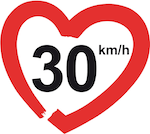What would you reply to the following question: “Which speed in town do you think is the most appropriate?” Believe it or not, there is a scientific answer to this question.
Boundaries of our human body
The human body is designed so that it can reach a speed of 30 km/h when running fast: indeed the world record is around 37 to 39 kilometers. At these speeds, also in a car, we are still able to process the information our brain is receiving. This allows us to respond to unforeseen events quickly enough to avoid accidents, by swerving out of the way, for example. So, Austrian Professor Dr. Hermann Knoflacher.
The European Citizen´s Initiative

The EU has clear road safety and environmental goals but these are not yet met. A 30km/h (20mph) standard speed limit would help to implement them more efficiently as it has proven successful in reducing injuries and fatalities, noise, air pollution and CO2 emissions, and improving the traffic flow. People can travel with less fear. Environmentally friendlier modes become more attractive. To meet the subsidiarity principle, the local authorities must have the final decision to set other speed limits on their roads and implement equivalent alternatives to meet the goals.
30 km/h (20 mph) limits are an inexpensive and popular way to improve safety, cut pollution and encourage smarter travel choices. They lead to improved traffic flow and less congestion. People can move without fear. What is the vision? 30 km/h should become the standard speed limits for villages, towns and cities with local authorities being able to decide on exemptions. The initiative wants the commission to come up with a proposal to introduce 30 km/h speed limits.
Support for the initiative
The European Commission and its Director of Sustainable Mobility in DG MOVE (Mobility department of the European Commission), Olivier Onidi, also stressed the fact that protecting the most vulnerable road users has to be a priority for urban mobility planners. The Commission has indeed been feeling some pressure concerning road safety, by the ongoing campaign for the European Citizen’s initiative to limit speed in urban areas to 30km/h. If the initiative manages to collect 1 million signatures, the Commission will be forced by law to consider taking legal action to limit speed to 30kph.
Isabelle Durant, Vice President of the European Parliament went even further, calling for the rights of vulnerable road users to be enshrined in law. In a resolution passed on 27 September 2011 the European Parliament strongly recommends a 30 km/h (19 mph) speed limit in residential areas and on all single-lane roads without cycle tracks.
The European cyclist Federation ECF has been supporting and will continue to promote the 30 km/h citizens’ initiative. “The right to safety is a basic human right. Creating a feeling of traffic safety is of utmost importance if cycling is to increase. Besides simply creating a safe atmosphere, real efforts need to be made to address pressing safety issues. Calming traffic is key to achieving an actual improvement in street safety.” ECF brought 30K speed limits and active mobility on the agenda of the European Road Safety Day.
UK-bicycle user and road safety campaigner Rod King also supports the initiative: “It’s a policy which provides universal benefits to the majority of the population rather than just the minority who cycle. It’s a policy that can dramatically improve the livability of our streets with particular benefits for the young and old who may lack the mental acuity to assess the speed of vehicles or the physical agility to move quickly. It is also a policy which questions our values about streets and how they are public spaces to be shared for the good of the whole community rather than simply roads for car drivers.”
The “European Citizen´s Initiative” is a fascinating, brand-new policy instrument in the European Union. Aim is to collect the more than 1 million signatures needed within one year from at least 7 different member states of the EU. To support a European Citizens’ Initiative, you must be an EU citizen (national of an EU member state) and be old enough to vote in European Parliament elections (18 except Austria where the voting age is 16). For more information on the rules and conditions for the European Citizens’ initiative.
You can see the European Citizens´ Initiative here
To learn more:
How to improve urban safety for vulnerable road users
Safer Streets in Liveable Cities
Road safety 2012: How is your country doing?: This leaflet shows the situation at the end of 2012 and the progress made since 2010. Its purpose is to allow Member States and European citizens to compare their situation and to encourage them to continue their efforts regarding road safety.








[…] you wondering how to have your say on urban mobility? Check out the Library dossier on the ongoing European Citizens´ Initiative “30 km/h – making the streets liveable”. And should you wish to know more about this tool for participative democratic policy, be inspired […]